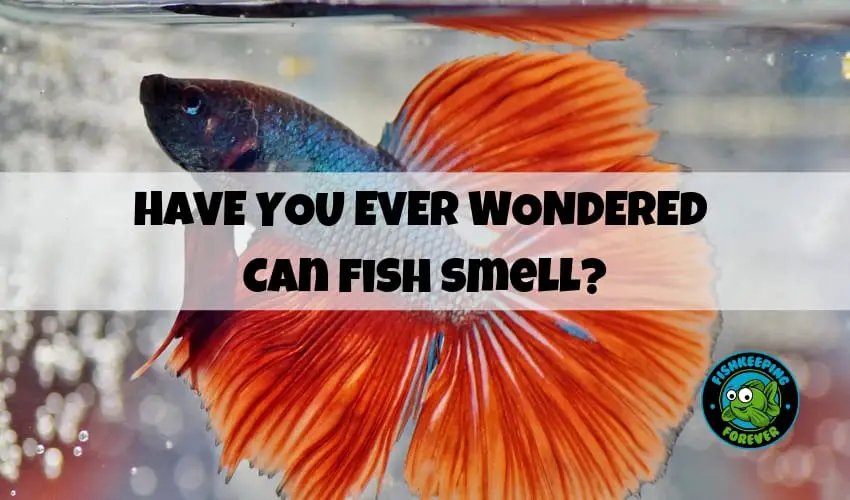Have you ever, despite keeping fish for years, all of a sudden had a question about them that you’ve never even thought about before? I have, and it was recently, whilst feeding my Betta Simorum to be exact.
Can fish smell? – Fish have little holes in their mouths called nares which are basically fish nostrils. Fish use smell to communicate and feeding by utilizing pheromones and amino acids. Fish do smell but use smell differently to us humans.
Betta Simorum is a wild species of Betta that unlike their feisty relatives, the Betta Splenden, is incredibly shy. They spend most of their time hiding under leaves and plants at the bottom of their aquarium completely under cover.
However, when it comes to feeding time, these shy but gorgeous fish are right on the ball. Out pop, their heads, followed, by their bodies, and up to the surface, they go. There they feast before slinking back off to the depths to rebury themselves in foliage.
This, led me to wonder how they knew they were being fed? They couldn’t possibly see me approaching or the food on the surface from their hiding spots. Was it possible that they could, in fact, smell the food? And if so, well does that mean fish have a nose?
The really quick answer is that indeed fish can smell but that they do not have a nose. They do, however, have nostrils which can be seen if you get really close.
How you ever wondered exactly what smell is?
Table of Contents
How Do Fish Smell?
All fish have little holes above their mouths which are called nares. These are a fish’s nostrils basically, just called by a fancier name. These nares, however, do not lead to the throat in the way that mammals nostrils do. Rather, they open up into a chamber which is lined with sensory pads.
There are two holes on each nare, an inlet, and an outlet, separated by flaps that also push water into the nare as the fish moves. How water is pushed into the nares varies dependent on the fish. Some can remain immobile and pump water through their system via tiny hairs known as cilia. Whilst others use a muscular movement to get the water flowing. Many smaller fish such as Mackerel can only move water through their nares and system when they are swimming.
Once water is pumped into the nare, it travels down to the sensory chamber which has a structure known as a rosette. On the rosette, sensors are found, which can number an amazing 500,000 per square millimeter in some fish. These sensory pads pick up chemical signals and send them to the fish’s forebrain where they are deciphered as to their meaning.
How Do Fish Use Smell?
Fish use smell for communication and feeding by utilizing pheromones and amino acids. Pheromones are used to communicate such as in mating, courtship, and to warn of danger. Amino acids, on the other hand, indicate food. This is due to amino acids forming the molecular building blocks of proteins which are the structure of all living animals. These amino acids dissolve into the water and alert the fish to food.
Interesting Fish Smell Facts
-
- An Eels sense of smell is 1000 times better than a Pikes.
-
- Sharks can sense a preys amino acid at concentrations as low as one part per billion. That’s the equivalent of one drop of blood in an Olympic size swimming pool.
-
- Barracudas do not hunt by smell, rather by sight. They are attracted to shiny things.
-
- An Atlantic Salmons sense of smell is 1000 times better than that of a dog.
-
- Parrotfish can make themselves a kind of mucus sleeping bag that masks their smell to predators.
- Up to 40% of a sharks brain is dedicated to smell.
A Word Of Caution
Normally, I would end this piece with a few words summarizing a fish’s ability to smell, and the fact that they don’t have a nose! However, this time it’s going to be a little bit different and we will end with a word of caution.
A sense of smell, as we now know, is vital to fish, they need it to survive. However, according to a recent study published in the journal ‘Nature Climate Change’, fish are losing their sense of smell.
This loss of smell is believed to be caused by rising levels of carbon dioxide which is polluting the world’s water systems. The study also suggests that fish will need to adapt substantially to survive this sensory loss and that it may just not be possible. A sobering thought I’m sure you’ll agree, and one I’ll leave you to ponder on.

I have been working in the tropical fish industry for over 30 years now and I’m still learning. Everyday is a school day in this hobby. In my spare time I play golf very badly!


